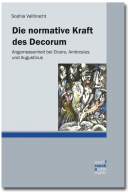-
3.5.2024
Wittgenstein's alternative concept of language to Augustine's
Who would have thought that Descartes’ famous cogito-argument was already asserted well before by Augustine, the professor of rhetoric and bishop of Hippo? Who is thinking of Augustine as a …
read more ...
-
 20.3.2024
20.3.2024
Work in progress
Me and my esteemed colleague Dr. Bryan Hanley are working on a book project about philosophy and science at the moment. So stay tuned for further details about this enthralling interdisciplinary …
read more ...
-
22.6.2022
Review in Augustiana
Sophia Vallbracht: Review of J. Warren Smith: Ambrose, Augustine, and the Pursuit of Greatness. Cambridge/New York: Cambridge University Press, 2020, in: Augustiniana, Leuven: Peeters Publishers …
read more ...
-
5.4.2022
Why did Hume think that we cannot have any experience of causation?
In his groundbreaking Enquiry Concerning Human Understanding IV,1 (1748) David Hume claims that „the observation of human blindness and weakness is the result of all philosophy, and meets us at every …
read more ...
-
 27.7.2021
27.7.2021
Decorum orationis & Decorum vitae
Aristotle stipulates man as a ζῶον λόγον ἔχων , i.e. as a living being that has λόγος, and one that perceives the world through his senses. This impacts how he sees the objective world of res, be it …
read more ...
-
1.5.2021
If mental states are causally inert do we have any reason to believe they exist?
Human consciousness and the very existence and concept of the mind or soul seem to pose the metaphysical touchstone for philosophers and physicist alike. Epiphenomenalism claims that mental states …
read more ...
-
30.11.2020
How can we know anything?
Most prominently since Plato’s quest for truth (ἀλήθεια) instead of appearance (δόξα), the human race is driven and defined by its urge for knowledge. Our mental capacity is the unique feature that …
read more ...
-
 15.4.2019
15.4.2019
Decorum as a normative force in rhetoric
Quod decet? This question arises in every rhetorical situation in which the orator wants to enforce his agenda through a speech. Even though appropriateness is a genuinely rhetorical category, it has …
read more ...
-
21.12.2006
The Ethos in Rhetoric and Politics
This thesis analyses the performance of ethos in a two-pronged approach. The first part is dedicated to the theoretical reflection of ethos and its historical development since Aristotle. Outstanding …
read more ...
 20.3.2024
20.3.2024 27.7.2021
27.7.2021 15.4.2019
15.4.2019